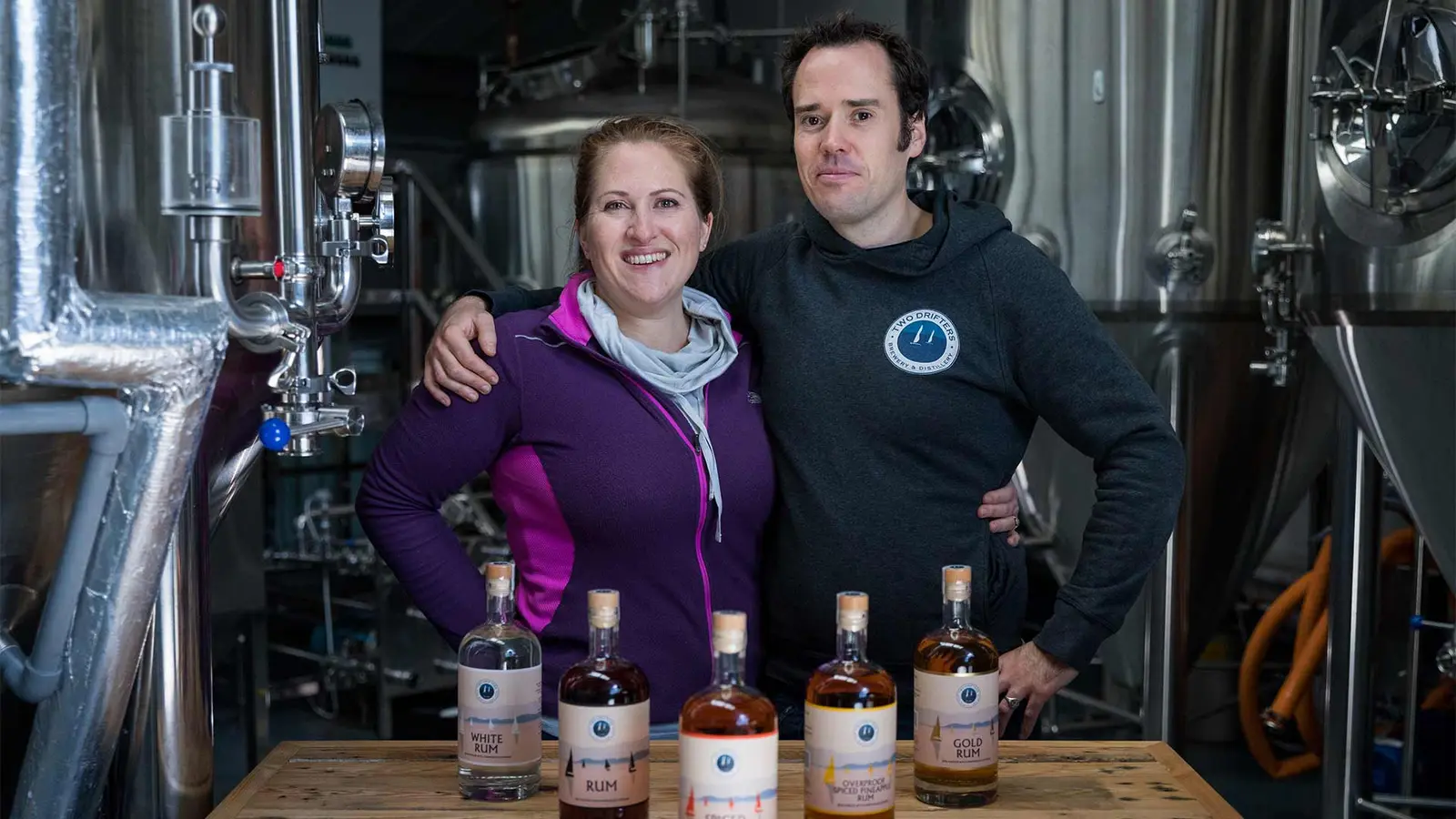Russ and Gemma Wakeham, Two Drifters Distillery
You’re going to make mistakes. You have to be OK with that.
 Spork Digital
Spork Digital- 10 min
Gemma and Russ Wakeham have two passions – making great rum and environmental sustainability. Happily, for rum lovers and the planet, they’ve brought these two passions together and created Two Drifters Distillery, a carbon negative – not neutral, negative! – distillery making award-winning, sustainable rums.
This was something utterly unique in our experience, so we jumped at the chance to ask them all about it – about their startup journey, the role of technology in their business and what advice they have for budding entrepreneurs.
Tell us about Two Drifters Distillery. What’s the story behind it?
RUSS: Gemma and I are the two drifters; we’ve stopped drifting now but before I was a chemist – academic – and every two years we’d be dragged to a different job in a different country and were taken all over the place. Then I got a postdoc position in Vancouver and we were super inspired by the craft beer scene. It’s such a great place and then there’s the West Coast vibe that we got caught by as well, which is to just go for it, entrepreneur-style, just get on with it.
That all came together with the fact that we wanted to get back to the UK, back to Devon but there’s not a lot in the way of chemistry jobs down here so we thought we’d start our own business. And that’s how the idea began. Then I got a fellowship in Swansea
GEMMA: That gave us time to get some skills. I did a social media marketing course. Before we went to Vancouver, I’d been a business development manager
RUSS: She had the sales part nailed down and was exploring the marketing while I was researching the carbon capture. But in the evenings, we were both out the back in our garage brewing, making beer and thinking ‘This is it – this is the business we’re going to set up.’ There’s no way to practice making spirits – you just have to do it
GEMMA: Also beer and cider you can make at home so that was what we started with, to get to grips with the whole process.
RUSS: The plan was to start with a brewery and purchase a distillery from selling that. That was how we imagined it in our heads. We were completely wrong.
I was going to ask if the business turned out exactly as you initially envisioned it.
RUSS: No, hindsight and all. But we got very good at making beer and set up a company to sell it. That’s how Two Drifters was born. Turned out distilling equipment was affordable so we started with a 2000 litre brewery and a distillery that could make about 80 bottles a week.
GEMMA: There’s a gap in that story, though – when we decided to open the business, we sold the house in Swansea, moved in with my parents and so the investment was literally the sale of our house.
RUSS: Yes, it took about 6 months to set up and we started selling in April 2019. And within 3 months, it was clear that 80 bottles a week of rum wasn’t going to cut it.
GEMMA: We were a bit naive at the beginning, thinking we needed the beer to carry the rum.
RUSS: So, three months in we stopped selling beer all together and we’ve gone from 80 bottles a week to between 1800-2000 bottles.

What was the moment when you realised you were really onto something?
RUSS: I don’t know if we’ve had that moment.
GEMMA: Actually, yes. I know exactly when it was. People had asked if we were open to investment and we always said no because we felt we wanted to get ourselves to a place first where we felt – as you asked – that we were on to something. It was in October 2020 when we decided to go for crowdfunding. We went for it then because we knew we were making the rum as amazing as we possibly could, we knew how we could offset the CO2 – no footprint. That’s as far as we could take it on our own. We needed to scale up, needed money for branding, expansion. So, we went for crowdfunding and within 3 hours of going live, we’d reached 100%. That’s when we knew. By Christmas we were at 190%.
Is there anything you wish technology could help with more?
GEMMA: Russ is desperately trying to find an inventory software….
RUSS: I’m on the hunt. An MRP (Material Requirements Planning) system would just be amazing. I have loads of spreadsheets – technology as it starts for everyone. We have batch traceability requirements, being able to say this bottle was made on this date with all of these ingredients; we do the forward and back traceability for our food hygiene levels to keep that certification. So, we have spreadsheets to do that, but they don’t integrate with the selling side or Xero. That means a lot of duplication and very manual. The trials I’ve tried are just so overly complicated. Other distilleries I’ve talked to make their own. There is no good solution.
GEMMA: I think with distilleries, they’re unique – even from each other so nothing is going to suit all of them.